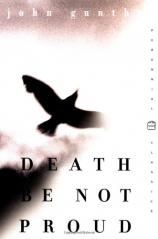Reading Group Guide
Discussion Questions
Death Be Not Proud

1. This book is a memoir, a true story of a boy's illness and death, but it is also a carefully crafted narrative. Discuss the techniques and strategies that Gunther used to create characters, to make Johnny come alive for us as readers, to involve us so deeply in the story. Why is this book so compulsively readable?
2. Many of us read this book in high school or junior high, and then returned to it as adults. Talk about the experience of reading the book at different times and different circumstances of your life - as a young person, as a parent, as a person who has experienced tragic loss.
3. At one point Gunther asks, "what is a mind for except to reason with?" What insight does this shed on his approach to Johnny's illness? What limitations does this approach impose on him as a man, a father, a participant in this tragedy?
4. Gunther grapples in an agonized way with the meaning and purpose of Johnny's life and untimely death. Do you find his thoughts here satisfying? Do you think he has plunged into the heart of the issues here or do you feel he has somehow skirted the issue?
5. The mysteries of cancer are at the heart of the book. Discuss the ways in which Gunther tries to fathom and come to terms with this disease. How has our understanding and treatment of cancer changed in the decades since Death Be Not Proud was written?
6. Gunther writes in a particularly searching, emotionally charged passage of the book: "A primitive to-the-death struggle of reason against violence, reason against disruption, reason against brute unthinking force -- this was what went on in Johnny's head. What he was fighting against was the ruthless assault of chaos. What he was fighting for was, as it were, the life of the human mind." Talk about your reactions to this quote. Do you agree with this view of Johnny's disease? Does this in your opinion capture the essential meaning of the story?
7. Johnny's death is the central event of the book, and yet when death comes it is very quiet and almost anti-climatic. Why did Gunther choose to present the death scene in this way? What impact does it have on your experience of the book?
8. The book concludes with Johnny's letters and journals and then a brief word from his mother. How did the journal and letters alter your views of Johnny's character and situation? Would the book have a different "feel" and different message if Gunther had simply ended with his own description of the events?
9. Memoirs were certainly part of the literary scene when this book was published in 1949, but today they are arguably the dominant and most compelling genre. Discuss the shift in taste, attitude, and literary approach that accounts for the current popularity of memoirs. Talk about recent memoirs that this volume may have influenced. How has the memoir genre changed since Gunther wrote this book?
Death Be Not Proud
- Publication Date: August 5, 1998
- Paperback: 205 pages
- Publisher: Harper Perennial Modern Classics
- ISBN-10: 0060929898
- ISBN-13: 9780060929893






